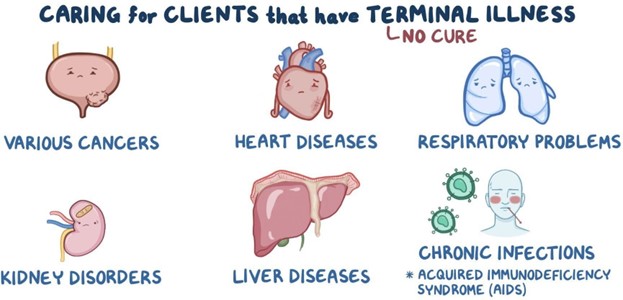The practical nurse (PN) should collect the following information during the admission assessment of a terminally ill client to an acute care facility:
Health care proxy documentation
Name of funeral home to contact
Client's wishes regarding organ donation
Contact information for the client's next of kin
The Correct Answer is A
The correct answer and explanation is:
a) Health care proxy documentation.
This is the information that the PN should collect during the admission assessment of a terminally ill client to an acute care facility. Health care proxy documentation is a legal document that appoints a person to make health care decisions for the client when they are unable to do so themselves. It is important to have this information in case the client's condition deteriorates and they need end-of-life care.
b) Name of funeral home to contact.
This is not the information that the PN should collect during the admission assessment of a terminally ill client to an acute care facility. Name of funeral home to contact is a personal preference that may or may not be relevant for the client at this point. It is not a priority for the admission assessment, and it may be insensitive or inappropriate to ask the client about it.
c) Client's wishes regarding organ donation.
This is not the information that the PN should collect during the admission assessment of a terminally ill client to an acute care facility. Client's wishes regarding organ donation are a personal choice that may or may not be applicable for the client depending on their diagnosis, prognosis, and eligibility. It is not a priority for the admission assessment, and it may be offensive or upsetting to ask the client about it.
d) Contact information for the client's next of kin.
This is not the information that the PN should collect during the admission assessment of a terminally ill client to an acute care facility. Contact information for the client's next of kin is a general demographic data that may or may not be relevant for the client's care. It is not a priority for the admission assessment, and it may be already available in the client's records.
 |
Nursing Test Bank
Naxlex Comprehensive Predictor Exams
Related Questions
Correct Answer is C
Explanation
Choice A rationale:
The nurse should respect the client's autonomy and right to make decisions about her own care. It is essential to honor the client's refusal of further treatment, and the nurse should communicate this to the family. In this situation, the client has the capacity to make her own decisions, and her wishes should be respected.
Choice B rationale:
Attempting to persuade the client to participate in the clinical trial for one month is not an appropriate approach. It disregards the client's autonomy and her right to refuse treatment. It's essential to respect the client's decision, and trying to convince her against her will is ethically and legally inappropriate.
Choice D rationale:
While it's important to ensure that the client fully understands the implications of her decision, doing so in front of her children may create additional pressure or discomfort for the client. The best approach is to have a private conversation with the client to assess her understanding and provide information or support as needed.
Correct Answer is C
Explanation
The correct answer is: C. Bronchospasm.
Metoprolol is a selective beta-1 blocker, primarily affecting the heart, but it can still have some impact on beta-2 receptors in the lungs. In clients with respiratory conditions like asthma or COPD, beta-blockers can trigger bronchospasm, leading to breathing difficulties.
Here's why the other options are less likely to be adverse effects of metoprolol:
-
A. Tachycardia: Metoprolol actually lowers heart rate, so tachycardia is not a typical adverse effect. Instead, bradycardia (slow heart rate) is more common.
-
B. Hyperglycemia: Beta-blockers can sometimes mask symptoms of hypoglycemia, but they don’t directly cause high blood sugar.
-
D. Hyperkalemia: Metoprolol doesn’t significantly affect potassium levels, so hyperkalemia is not a common concern.
Since metoprolol is frequently used in hypertension management, nurses must monitor clients for bradycardia, hypotension, and signs of bronchospasm, especially in individuals with respiratory disorders.
Whether you are a student looking to ace your exams or a practicing nurse seeking to enhance your expertise , our nursing education contents will empower you with the confidence and competence to make a difference in the lives of patients and become a respected leader in the healthcare field.
Visit Naxlex, invest in your future and unlock endless possibilities with our unparalleled nursing education contents today
Report Wrong Answer on the Current Question
Do you disagree with the answer? If yes, what is your expected answer? Explain.
Kindly be descriptive with the issue you are facing.
